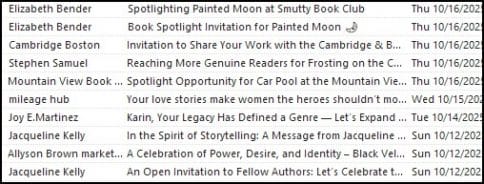Not everything is on fire.

Down to Business
ON THE PAGE
Modern life 2025: Generative AI is weaponized by unethical people – with little attempt to restrain it by the people profiting from its users – to spread lies daily by the thousands, sow anger to keep us glued to the feed for ads, and STEAL from us with endless scams. Fake facts, fake faces, fake words.
There are no guardrails except our own skepticism.
The new(ish) AI-powered scams that target writers are off the charts for the sheer volume – and their rising sophistication. I know lots of authors have been talking about the onslaught of email spam.
It’s not just email now. It’s also large-scale deployment of chat bots in groups. This article from Victoria Strauss and Writer Beware has all the receipts. Writers, read it for your own safety. There are screenshots of chat bot activity trying to convince an author that they are a book club currently reading their book.
Link to Writers Beware: Army of Bots: Deeper into the Vortex of Nigerian Marketing Scams
Take the 5 minutes – and if you’re not following Writer Beware, why the heck not? I’ve trusted Victoria Strauss and the site for more than a decade.
Feel free to share this blog or, better yet, the direct link to the article on social media, in writer groups, your own Discord groups, etc.
https://writerbeware.blog/2025/10/20/army-of-bots-deeper-into-the-vortex-of-nigerian-marketing-scams/
The Tsunami is Real
While on vacation for 24 days I received:
- 19 fawning over-the-top, marketing scams that promised the very same “organic” connections to big book bloggers and book clubs.
- 7 book club fakes with “enthusiastic, committed reviewers who love your book and can’t wait to talk about it,” yet who have to be “tipped” in advance for their reviews.
- 3 impersonation emails from big name authors who were dying to hear about my creative process. Big name? Like that author who’s written a gajillion horror novels and screenplays. Sure, he needs to know about my creative process.
While all of these emails pledged to have studied my book, as they parroted text found on my own web site, only a couple mentioned the LGBTQ audience and NONE used lesbian or sapphic, both of which are found repeatedly on my site. Almost as if they were avoiding filters for terms AI bots have decided could be offensive?

The screenshot is just a sample.
All of them were from Gmail accounts, including the “big name” authors. Gmail accounts are easy to get, and because each email is individualized to a degree, it’s nearly impossible to use a predictive blocker to filter them out without also catching legitimate correspondence.
It’s a tsunami and so far there’s no higher ground in sight.
Like Victoria Strauss, I’ve never seen anything like this volume – and the overall sophistication, including using dozens of chat bots (and having them make typos for verisimilitude!) to create a fawning book club that is entirely fake. AI also allows them to create websites that pass a first sniff test.
Since originally posting the article on social media, authors have also mentioned being approached on Discord by AI bots claiming to be artists, or event planners who’ll arrange a bookstore signing or mini-convention all about you – fees paid in advance, of course. All offering websites with testimonials and examples of work – all fake.
The Book Club Scam is Particularly Bad
The book club scammers promise reviewers who accept “tips” – a scheme that desperately tries to make it sound like it’s not pay-to-play. The “tips” *cough cough* are required in advance, of course. There’s no suggestion that, without tips, reviews would be written.
They can call the payments kumquats, but they’re still pay or you don’t get no play. (Now I want kumquat marmalade on a crumpet. But I digress.)
While for the most part no reviews are even generated after money changes hands for “book clubs” to write reviews (because it’s a scam!), if they actually produced reviews it could take a nasty turn – and the only person who faces consequences is the author who made the decision to pay for these kinds of sketchy reviews.
Why? Two reasons. To start with, lack of disclosure about compensation for reviews is a civil violation in the US. A reviewer must disclose even a free copy of a book as compensation. Disclosure is the responsibility of the reviewer; these reviewers are AI bots run by thieves. They don’t care. But the author’s name is tangled up with what readers may figure out are faked reviews.
Hell hath no fury like a reader who has been misled. You can quote me.
Even worse, paying review mills to post positive reviews is strictly forbidden by Amazon. If an Amazon bot decides an author is doing so, they could close the author account without warning or appeal. The thought of which ought to make any author have a sphincter-tightening reaction.

Della Street and Her Epic Side-Eye
And Now for the Unexpected Follow-On
Writing this blog veered in an unexpected direction. I first wanted only to amplify the stellar work by Writers Beware. Quick and easy. Well, nothing is ever quick and easy in my brain. Because it made me think about how easy AI makes it for anyone to produce fake content.
And then I made an inescapable, uncomfortable connection: in the wide fiction community, there have to be brands and author teams using AI in the same ways – fake conversations, fake accounts, fake testimonials, and so on – to manipulate readers and the marketplace.
I’ve suspected this was true. Now that I see how easy it is for scammers to fake a business, customers, clients, and conversations, it seems common sense that there are fiction teams doing the same thing in the name of “marketing.”

A Wee Puppy in a Big World Wondering About the Future
Underpinning this thought is that I know some people have created multiple social media accounts to pretend to be someone they’re not. There are authors who chat with themselves in online book groups using multiple accounts. Now chat bots can make doing so incredibly quick and easy, and even less likely for someone to slip up when juggling the accounts.
If this is actually going on, maybe it’s time to talk about the consequences for readers, the marketplace, or the vast majority of writers who are completely ethical and yet comparing themselves to fakes – to the point of despair.
Faking is Practically Free
The scammers have proven that AI can make an endless stream of fake testimonials, photos of fake people, and give them fake bios. They can do it quickly and almost for free. For an aggressive marketing brand / author team looking for low budget ways to promote, it certainly has to be cheaper than paying page-turning farms to game Kindle Unlimited or bribing street teams with Tiffany bracelets to coerce page turns and reviews from real readers.
After the page-turning farm and copy/paste scandals that really showed how far some rapacious people would go to steal KU payout and bestseller badges from authors who earned them legitimately, I’ve taken a lot of marketing claims with the proverbial grain of salt.
These days my skepticism is growing by leaps and bounds as the AI era unleashes fake content into the online content stream at an almost unimaginable rate.

Why Do I Care?
In basic mental health terms, I’m not comparing my own worth, my success, nor my ability to connect with readers, to what seem to me to be fakes gaming the system. Fake reviews have always been around. But now they’re appearing in bot-driven quantities that can suck the air for anyone else right out of a group or site.
I also wonder to what extent readers are being diverted from finding their next favorite book by chat bots. Are chat bots why so, so, so many readers never escape the mainstream (and extremely small) sapphic fiction bubble to find the vast numbers of sapphic books from small presses and indie writers? Because when they ask for recs on their favorite platform, chat bots comment repeatedly on behalf of the same handful of titles?
Unethical Behavior in the Fiction Community is Not New
Believe me, it is nothing new that people think any way they earn money is sacred. The impulse to cheat is not new. AI doesn’t make people cheat. They decide to cheat. AI now makes it very, very easy. And if it’s so easy, well, how can it be that bad?
If the software lets you do it, it must be okay – that’s the hallmark of gamer tech bro mentality.
Bottom line, I’m skeptical now about everything I see on social media unless I’m convinced otherwise. And that keeps me from comparing myself to faked online content or author brands busily gaming visibility, reviews, and sales through the use of generative AI and chat bots.
A Promise – No Gen AI for Me. Ever.
Just for the record, then, I have never and will never use generative AI in any aspect of my creative process. The end.
Good, Bad, or Ugly? It’s. All. Mine.
As I have said many times in real life and here at my site, all mistakes are mine. I own them. I welcome being told about them. I want to learn, grow, and always do better next time.
And all the good stuff is mine, all mine. All. Mine.


